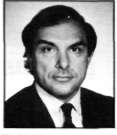 |
Home | Search | Browse | About IPO | Staff | Links |
 |
Home | Search | Browse | About IPO | Staff | Links |
|
The Pulse Looking for leadership 
By MICHAEL McKEON This is the first of a new, regular column contributed to Illinois Issues by Illinois pollsters. "The Pulse" will present both survey data and the insights, opinions and observations of the pollsters. Mike McKeon of Joliet inauguarates this column; the other Illinois pollsters who will contribute future columns are Richard Day of Evanston and Nick Panagakis of Mount Prospect. On November 10, Bruce Springsteen's live anthology album was released. Throughout the country, fans jammed record stores to buy more than a million copies the first day. Song after song in the album described the economic and social desperation of millions of working class Americans who had lost their jobs, seen their families broken up, or lost a large part of their paychecks to an economy that was shifting from an industrial to an informational base. On the same day, administrators in rural counties in Illinois and throughout the Midwest were dealing with requests for large budget increases from sheriffs' offices. The lawmen were being swamped with crisis calls, including pleas to break up domestic battles, carrying out foreclosures in the face of angry farmers, and finding it increasingly difficult to keep the peace. The same day, Time Magazine was preparing an article on the new homeless. A major portion of this group, the article says, are "single mothers who cannot afford to pay the rent and support their children at the same time." There is a subtle shift of emphasis in the women's rights movement. If you listen with an ear for social nuances, you no longer hear cries for defense of civil rights, but for economic survival.
Six days before, on November 4, there was an election in Illinois. The voters did not turn out. The turnout was the lowest in 44 years in the nation. In Illinois, less than 36.1 percent cast votes in the U.S. Senate race. Overall, it was the third lowest vote in history. Apathy, the experts said. No sir, it wasn't apathy. The dictionary defines apathy as "the lack of feeling or emotion," or "the lack of interest or concern." I examined the problem as a professional poll taker, taking data from polls before and after both elections. The conclusion was that those who turned out did so to vote for specific candidates, but many did not because there was no desire to vote for traditional parties. The political parties are losing the allgience of the voters because they are perceived as failing to make commitments. Perhaps they make too many concessions to contributors or special interest groups. Regardless, the feeling is that Washington has lost touch with the heartland. 36/January 1987/Illinois Issues Part of the problem is that in order win, candidates spend inordinate amounts of money on TV and radio commercials that attack their opponents. This negative campaigning creates anti-issues, opening the issue gap even wider. There is a political vacuum today, waiting to be filled by committed and passionate candidates. The other day, Janice Hart, the LaRouche disciple who won the primary election for secretary of state, but who was defeated in the regular election, was asked by the gathered media if her cause was lessened because of the election results. "You're here, aren't you?" she answered. There is a scary wave of distrust out there, a feeling of barely suppressed violence. The out of work, the hungry, the frightened jobholders are looking for leadership. A certain brand of leadership is indeed being offered — and by the most modern means. The Christian right has its private television network. The messages they send out are not analyzed by commentators nor discussed by newspaper critics. They come pure and unsullied by examination. Lyndon LaRouche has his own newspaper, where his unique visions of mankind can flourish without the carping of editorial fairness. I won a little fame for predicting the [primary victory of the LaRouchies. I also predicted that Mark Fairchild, the LaRouche candidate for lieutenant governor, would get about 7 percent of the vote. I realized a disquieting fact: 42 percent of the voters who said they were voting straight Democratic admitted that they didn't care that a portion of their vote was going to supporters of Lyndon LaRouche. The tragedies of our time — the farm crisis, the blacks and whites out of work, the collapse of our big industries, the job market sagging from changes — are agonies for which no major party seems to have ideas for solutions. And worse, no major party seems to care. There's a dangerous breeze out there, swirling around a vacuum of leadership. It's a little breeze right now, but the biggest storm starts with a little breeze, and the twinds are blowing harder in Illinois and the nation. Micheal McKeon conducts public opinion research through his firm, McKeon and Associates of Joilet. 37/January 1987/Illinois Issues
|